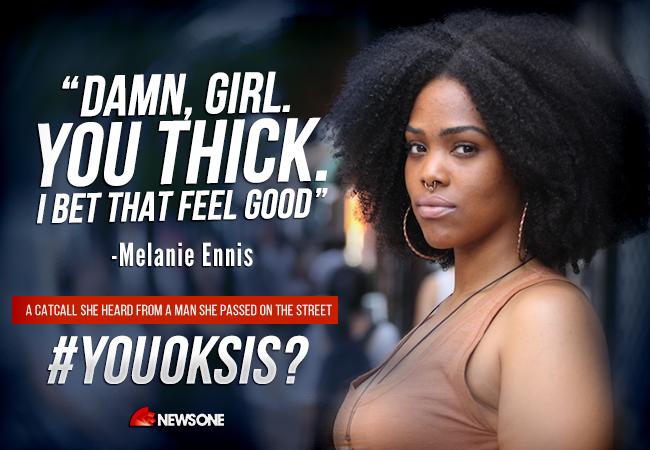[UPDATED] #YouOKSis Highlights Need for Intersectionality in Anti-Harassment Campaigns
"I feel like black women's voices are not always amplified. And I feel it's my responsibility to do that."

#youoksis Folks ready to admit they’re uncomfortable with Black women being the face of street harassment victims? pic.twitter.com/vURatVbcJ4
— Master Race Baiter (@FeministaJones) July 6, 2015
Social worker, activist, and writer Feminista Jones is sticking up for black women with #YouOKSis. In an interview with Noah Berlatsky over at The Atlantic, Jones discussed the narratives built around street harassment and the need for a hashtag like #YouOKSis, which came about when user @BlackGirlDanger suggested that the phrase she often used to check in with women should become a campaign to encourage speaking up about harassment and helping one another.
When asked how she responds to men who claim that street harassment doesn’t exist or that it doesn’t happen as often as women claim (“I think I have literally just about never seen a women get harassed on the street,” says the interviewer) Jones discussed how harassment doesn’t always look like a clear predator-prey dynamic. Often, women are taught not to provoke their harassers.
So what you may have seen is a guy walking alongside a woman and talking, and you may have seen her smiling, but for all you know he may be saying some really aggressive things to her, but you didn’t hear it because you walked right by.
Jones also spoke about why she felt it was necessary to specifically elevate the voices of black women, whom she feels are often overlooked. While street harassment happens to all women, Jones says that ignoring race as a factor ignores certain experiences and factors.
But the movement still continues to be focused on white women, often opposite men of color or black men. Sometimes it gets into, These savage black men are preying on precious white women. That narrative in the United States has gotten many black men jailed and killed. I wanted to focus on black women’s experiences with [harassment] from anyone. It could be white men, Asian men, women—I’ve talked about being harassed by two lesbian women. But I wanted to center our voices, because I feel like black women’s voices are not always amplified. And I feel it’s my responsibility to do that.
She points out that black women face more pressure to be strong and enduring, a notion that holds its roots in racist scientific misconceptions. The misogyny a black woman experiences is different from one a white woman experiences because it’s racialized. The historical hypersexualization of black women persists, Jones argues, citing ways in which black women are often more aggressively harassed, even by police.
I had a police officer try to talk to me in a flirtatious way with a hand on his gun. And I’m saying, “You need to do your job and stop trying to holler at me,” and he sort of smirks it off. But he has his hand on his gun, which is holstered at his waist. No, that’s not intimidating at all.
When Jones approached the New York Police Department to ask for protection from men harassing her, they simply told her to wear headphones and ignore it. “We can’t arrest people for speaking,” they said. When the people who are supposed to protect you fail at that, or even worse, are the aggressors, where are you supposed to turn? That’s where #YouOKSis comes in. As a social worker, Jones says that by intervening in a situation where you see someone being harassed with a simple “Are you okay?” you can de-escalate the situation. [Editor’s Note: Jones has pointed out that this Storify provides more context about how #YouOKSis got started.]
And just by putting yourself in that space, you make the harasser aware that somebody is watching, that somebody is paying attention, that someone is conscious. I did it. I witnessed a guy harassing a young mother pushing a stroller. I eventually asked her, “Are you okay, sis?” I said “sis” because she was black, and that’s how I talk to black women. And she looked so relieved, in that quick flash, that someone came and said something.
Many women are sharing their experience on Twitter with #YouOKSis, sharing news stories about women who were victims of violence, and giving support. While it’s very sad that the campaign has to exist because of the inadequacies of law enforcement and blindspots in anti-harassment campaigns, it’s great to see awareness and support build so quickly. If prosecution or protection is unevenly distributed or disproportionately targets a group of people, we need to address that and actively amend it.
[Editor’s Note: Please check out Jones’ entire interview over on The Atlantic for a more in-depth look at #YouOKSis.]
—Please make note of The Mary Sue’s general comment policy.—
Do you follow The Mary Sue on Twitter, Facebook, Tumblr, Pinterest, & Google +?
Have a tip we should know? tips@themarysue.com